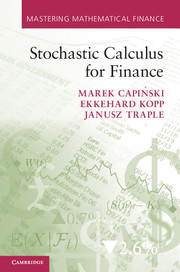1 - Discrete-time processes
Published online by Cambridge University Press: 05 November 2012
Summary
Our study of stochastic processes, motivated by their use in financial modelling, begins with discrete-time models, including and generalising the models studied in detail in Discrete Models of Financial Markets [DMFM], where the typical ‘process’ was simply a finite sequence of random variables defined on some finite sample space. We generalise this in two directions, by considering a general probability space (Ω, ℱ, P) and allowing our processes to be infinite sequences of random variables defined on this space. Again the key concept is that of martingales, and we study the basic properties of discrete martingales in preparation for our later consideration of their continuous-time counterparts. We then briefly consider how another basic class of discrete-time processes, Markov chains, enters into the study of credit ratings, and develop some of their simple properties. Throughout, we will make extensive use of the fundamental properties of probability measures and random variables described in Probability for Finance [PF], and we refer the reader to that text for any probabilistic notions not explicitly defined here.
General definitions
We take a discrete time scale with n = 0, 1, 2, … denoting the number of consecutive steps of fixed length h > 0, so time instants are t = nh ∈ [0,∞). In contrast to [DMFM], where we had finitely many times, we allow infinitely many steps as a prelude to the continuous case, where t ∈ [0,∞) is arbitrary, which we study in the subsequent chapters.
- Type
- Chapter
- Information
- Stochastic Calculus for Finance , pp. 1 - 35Publisher: Cambridge University PressPrint publication year: 2012



